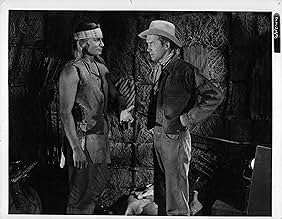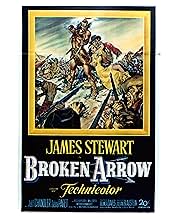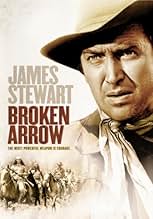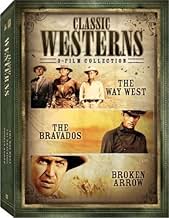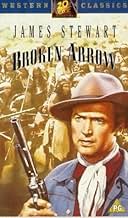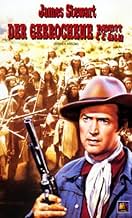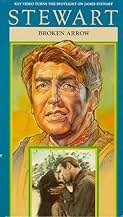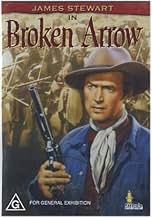CALIFICACIÓN DE IMDb
7.1/10
10 k
TU CALIFICACIÓN
Tom Jeffords trata de lograr la paz entre colonos y apaches en el territorio de Arizona.Tom Jeffords trata de lograr la paz entre colonos y apaches en el territorio de Arizona.Tom Jeffords trata de lograr la paz entre colonos y apaches en el territorio de Arizona.
- Dirección
- Guionistas
- Elenco
- Nominado a 3 premios Óscar
- 4 premios ganados y 6 nominaciones en total
Joyce Mackenzie
- Terry
- (as Joyce MacKenzie)
Robert Adler
- Lonergan - Stage Driver
- (sin créditos)
Trevor Bardette
- Stage Passenger
- (sin créditos)
Chris Willow Bird
- Nochalo
- (sin créditos)
Raymond Bramley
- Col. Bernall
- (sin créditos)
Chet Brandenburg
- Miner
- (sin créditos)
Argentina Brunetti
- Nalikadeya - Cochise's Wife
- (sin créditos)
Harry Carter
- Miner
- (sin créditos)
Iron Eyes Cody
- Teese
- (sin créditos)
J.W. Cody
- Pionsenay - Chosen Warrior
- (sin créditos)
Heinie Conklin
- Townsman
- (sin créditos)
Dolores Christine Cypert
- American Indian
- (sin créditos)
- …
- Dirección
- Guionistas
- Todo el elenco y el equipo
- Producción, taquilla y más en IMDbPro
Opiniones destacadas
Tagline: Of this motion picture the screen can be proud... Today... Tomorrow... A generation from now...
Worth repeating this tagline, because after seeing the film again for the first time in 42 years, it's right on. 50s westerns almost universally depicted Indians as pigeon-English speaking savages... or tried to talk Indian that translated to pigeon-Indian.
While the leading cast is all-Anglo, the perspective is that both sides in the Wild West were had more than a few intelligent, caring individuals among them. A willingness to sacrifice much (including renegades) to achieve a lasting peace is the message.
Jimmy Stewart had something to lose by doing a picture like this, but the acting here stands with any in his career. The portrayal of Cochise by Jeff Chandler is powerful, although unquestionably a little bit too noble-savagish.
"Let's mosey on over there" is a line spoken by Stewart toward the end of the film. Takes you back to a time when people took time to mosey.
A good-hearted picture by a little-known director standing up against the prevailing stereotypes. Wouldn't be surprised if Costner watched it more than once before making "Dances with Wolves".
Worth repeating this tagline, because after seeing the film again for the first time in 42 years, it's right on. 50s westerns almost universally depicted Indians as pigeon-English speaking savages... or tried to talk Indian that translated to pigeon-Indian.
While the leading cast is all-Anglo, the perspective is that both sides in the Wild West were had more than a few intelligent, caring individuals among them. A willingness to sacrifice much (including renegades) to achieve a lasting peace is the message.
Jimmy Stewart had something to lose by doing a picture like this, but the acting here stands with any in his career. The portrayal of Cochise by Jeff Chandler is powerful, although unquestionably a little bit too noble-savagish.
"Let's mosey on over there" is a line spoken by Stewart toward the end of the film. Takes you back to a time when people took time to mosey.
A good-hearted picture by a little-known director standing up against the prevailing stereotypes. Wouldn't be surprised if Costner watched it more than once before making "Dances with Wolves".
When I was a young boy I saw this picture. It was the first western in which the Indians were not uncivilised barbarians, but normal people, with their own standards. It was a revelation! At last one director had the courage to show this to us. So thank you, Delmer Daves! The performances of Jeff Chandler and James Steward were touching and also Debra Paget was fantastic. I do hope to see this film again someday on DVD. Hans Dullaart Delft Netherlands.
While I have seen better westerns, I was really impressed with Broken Arrow. Not just because it is a very good film, but it is also different. While a lot of westerns deal with themes(some complex, some not so much)such as revenge and betrayal, Broken Arrow is a very poetic and elegiac film that you can see perfectly in how the story is constructed. Also the Indians here are portrayed as those in want of freedom with their families, which I found refreshing, seeing as I have seen them portrayed as quite brutal. Broken Arrow is a beautifully photographed film, the script flows nicely and is thought-provoking and the score is very stirring. The acting is fine, Debra Paget, breathtakingly-beautiful she is, and her scenes with Stewart are touching, is good but I couldn't help thinking they could have cast someone older. James Stewart is very believable in one of his better western performances, while Jeff Chandler gives the best performance of his career here and also the best performance of the movie too. All in all, excellent and very moving film. 8/10 Bethany Cox
In this underrated Western, Stewart is an ex-scout who tries to make peace between the Apaches and the white settlers in 1870s Arizona. For some reason this film's reputation has taken a hit over the years, but it is quite enjoyable. Stewart made several Westerns in the 1950s, starting with this and "Winchester 73" in 1950. Although the latter film is more highly regarded today, this film is actually better crafted, boasting fine cinematography and score. Chandler gives perhaps the best performance of his career as the noble Apache chief who is willing to make peace. Paget (looking like Britney Spears!) plays Stewart's love interest.
As the war rages between the American settlers and the Apache, former soldier Tom Jeffords happens upon a young Indian wounded after an attack. Taking upon himself to aid the boy, it's not long before the Apache show up intent on killing Jeffords by way of the war instincts. Pleading for Jeffords' life, the boy manages to get him spared by the Apache chief, Cochise. It's the start of a friendship that may just bring and end to the war and peace across the west.
Tho not the first "social" Western film made, Broken Arrow, it can be argued, is maybe one of the most important and telling genre films of the 50s. Showing humanist portrayals of the Apache and dealing out level headed tellings of the relationships between whites and the Native Americans, Delmer Daves' film is as relevant today as it was back on release. Adapted from Elliott Arnold's novel Blood Brother, the story follows Jeffords (a measured and fine James Stewart) as he attempts to broker peace between the warring factions. Firstly by convincing Cochise (Jeff Chandler bang on form) to allow the mail run thru the pass, something that brings suspicion and calls of Indian lover from Jeffords' own kind, and then to finally set up a peace pact at a time when violence and hatred was rife in the west.
As the friendship between the two men grows, Jeffords and an Apache girl fall in love (beautiful Debra Paget as Sonseeahray), thus giving the story a further jolt of momentum. The screenplay then really hits its stride, as Daves and his crew pit peace and inter racial love against a backdrop of bloodshed and savagery. Never glossing over just how hard peace is going to be, Broken Arrow retains intelligence and a sensitivity even as breakaway factions from both sides (for example we see Geronimo split the Apache and form a renegade front) are intent on killing off the peace process. It even has time for deep emotional kickers to reinforce the point of just how tough and unlikely peace and tolerance can be sometimes.
Broken Arrow was, and still is, a bold picture. In fact it can be argued that for the likes of Daves and Stewart, it was at the time very bold and risky career moves. But it paid off because the film stands up today as a picture of some distinction. It's themes and approach to its subjects are something that this generation, and all the future ones, will always find to be socially important. Boosted by Hugo Friedhofer's luscious score and taking advantage of the Lone Pine location shoot, Broken Arrow is a fine fine film that even non Western fans should be looking to absorb. 8/10
Tho not the first "social" Western film made, Broken Arrow, it can be argued, is maybe one of the most important and telling genre films of the 50s. Showing humanist portrayals of the Apache and dealing out level headed tellings of the relationships between whites and the Native Americans, Delmer Daves' film is as relevant today as it was back on release. Adapted from Elliott Arnold's novel Blood Brother, the story follows Jeffords (a measured and fine James Stewart) as he attempts to broker peace between the warring factions. Firstly by convincing Cochise (Jeff Chandler bang on form) to allow the mail run thru the pass, something that brings suspicion and calls of Indian lover from Jeffords' own kind, and then to finally set up a peace pact at a time when violence and hatred was rife in the west.
As the friendship between the two men grows, Jeffords and an Apache girl fall in love (beautiful Debra Paget as Sonseeahray), thus giving the story a further jolt of momentum. The screenplay then really hits its stride, as Daves and his crew pit peace and inter racial love against a backdrop of bloodshed and savagery. Never glossing over just how hard peace is going to be, Broken Arrow retains intelligence and a sensitivity even as breakaway factions from both sides (for example we see Geronimo split the Apache and form a renegade front) are intent on killing off the peace process. It even has time for deep emotional kickers to reinforce the point of just how tough and unlikely peace and tolerance can be sometimes.
Broken Arrow was, and still is, a bold picture. In fact it can be argued that for the likes of Daves and Stewart, it was at the time very bold and risky career moves. But it paid off because the film stands up today as a picture of some distinction. It's themes and approach to its subjects are something that this generation, and all the future ones, will always find to be socially important. Boosted by Hugo Friedhofer's luscious score and taking advantage of the Lone Pine location shoot, Broken Arrow is a fine fine film that even non Western fans should be looking to absorb. 8/10
¿Sabías que…?
- TriviaThe broken arrow, which signals an end to fighting, is in fact a Blackfoot Indian symbol, not an Apache symbol. The Blackfoot are native to Montana and Alberta, Canada.
- ErroresWhen General Howard is beginning to pick himself off the ground after the Apache attack on the military wagon train, the first shot shows the ground to be mostly desert sand, with very little vegetation, but when the scene jumps to a long shot of the General getting up, the ground around him is almost entirely covered with green vegetation, showing scarcely any sand at all.
- ConexionesFeatured in Family Classics: Family Classics: Broken Arrow (1963)
Selecciones populares
Inicia sesión para calificar y agrega a la lista de videos para obtener recomendaciones personalizadas
- How long is Broken Arrow?Con tecnología de Alexa
Detalles
Taquilla
- Total a nivel mundial
- USD 10,145
- Tiempo de ejecución1 hora 33 minutos
- Relación de aspecto
- 1.37 : 1
Contribuir a esta página
Sugiere una edición o agrega el contenido que falta

Principales brechas de datos
What is the Hindi language plot outline for La flecha rota (1950)?
Responda

